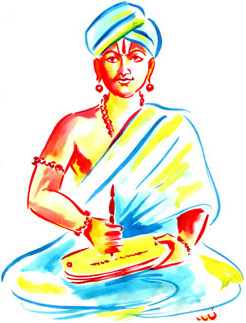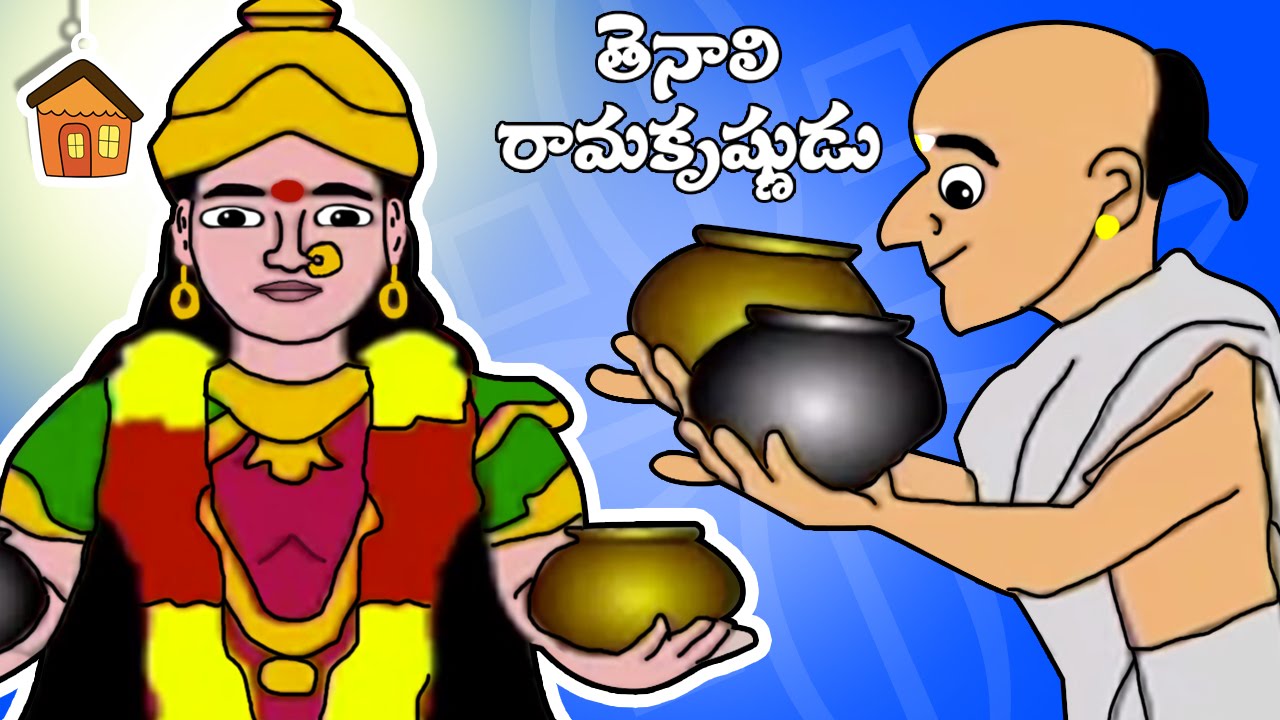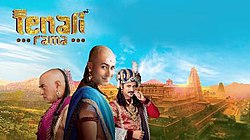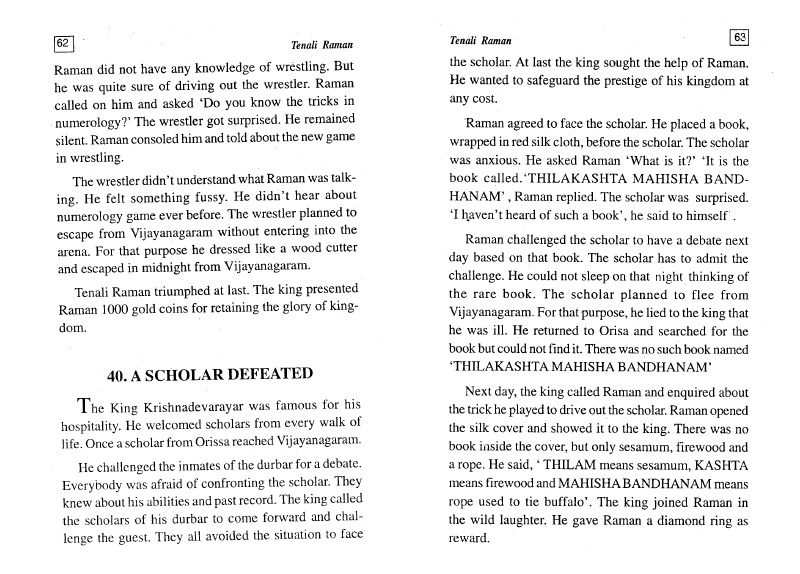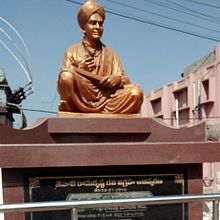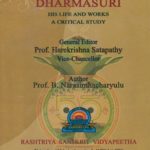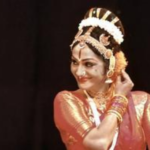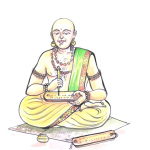Every once in a while we come across a Personality who so captures our imaginations and hearts that he almost comes to epitomise the character of our people. In the long line of personality clashes and caste battles, there are some figures who cause us to rise above petty parochialism and appreciate what unites us. Indeed, when Andhra Cultural Portal was first launched, he was among the few who were mentioned as representative of the Andhra Brand.
The next article in our Continuing Series on Andhra Personalities is one who is synonymous with an Empire yet to be discussed at-length, yet is one so necessary for the times: Tenali Ramakrishna.
Background
Though thought by most to hail from Tenali, Ramakrishna was born in the village of Garalapadu. His father Ramayya, was a temple priest who died at an early age. His mother Lakshmamma decided to return to Tenali, where young Ramakrishna grew up under his Uncle’s protection. It is thought by many that his family was Saivite, and so, was originally named ‘Ramalinga’, but to fixate on this issue would be to cave in to the parochialism that has already swamped Telugu land.
Already it is said by many that casteism had reached such a ridiculous peak in Ramakrishna’s time, even sub-castes were being denied education. Legend has it that despite being born into a smaartha Brahmin family, Ramakrishna faced such discrimination in his own township. Unable to gain an education, he had become a full-grown boy without becoming literate. His childhood had been spent idling away with other illiterate boys. This would have an effect on him in later life when he developed greater empathy for the lower classes.
Unable to bear the shame of being deprived of scholarship, Garalapadu’s favourite son began begging teachers to teach him. Finally, a sadhu is said to have taken him under his wing. Recalling the tuition of Kavi Kalidasa, the soon-to-be Vikata Kavi fell at the feet of Kalika Devi herself. Like Maharishi Valmeeki, Tenali Ramakrishna would recite the name of his most beloved deity countless times (11 crore according to some). Pleased with his devotion, the Goddess of Goddesses is said to have blessed him with scholarship. And with that, Legend became History and a Legend was born.
It may be difficult for those of us who are rational-empirical to accept the supernatural, and yet, the rare genteel empathy for the masses of one so learned as the author of the Panduranga Mahatmyam, is proof enough of Divine intervention. The arrogance of learning had begotten (and still begets…) far too many murkhapanditas. Pandit Tenali Rama was just the right medicine to make things right. He was a mirror to all, and above all, a mirror of his times, which is why stories about him remain so heartwarming. Despite excellent erudition, like that other nakshatra of the Vijayanagara Empire named Annamacharya, he was a man of the masses.
If indeed Ramayya’s son was originally named Lingayya, it was fitting that he composed the Linga Purana soon after becoming learned. Soon, he married a young woman named Kamala and had a son (Madhava). The burdens of being a grhastha (householder) necessitated a steady income. Though legend has it that Tenali Rama’s rivalry with Thathacharya first stymied his entry to the Imperial Court, he was soon able to make his mark through his hilarious yet educational antics.
“Krishnadevaraaya figures as the memorable king of the dynasty. The southern kingdoms submitted to his lordship, and he became the emperor of most of Southern India, from Vengee Naadoo down to the modern Trichinopoly district. Krishnadevaraaya is known as Aandhra Bhoja, for his constant support and encouragement to Telugu literature.” [2, 26]
“Tenali Ramakrishna, apart from his matchless capability of performing jests, had a charismatic personality also. He was loved by all, excepting a very few who were jealous of him due to certain personal reasons.” [1, 24]
That is the great tragedy about Tenali Rama. Though he is known to youth all over India as a comedian, he was highly knowledgeable in his own right and had a number of compositions to his credit. There may be something to the tale of goddess Kaali’s cursing of the kavi, saying that despite his learning he would be remembered as a jester (vidusaka). But in truth, he was the vikata-kavi of vikata-kavis. As the poet who caused such boisterous laughter, Tenali Ramakrishna would give us the true meaning of high-brow humour. He ably served as a court scholar and as per his station, advised the Emperor. In fact he used it primarily to advance the cause of justice for both high and low, and to lay low the gigantic egos of the time who proved Acharya Vishnusarman right.
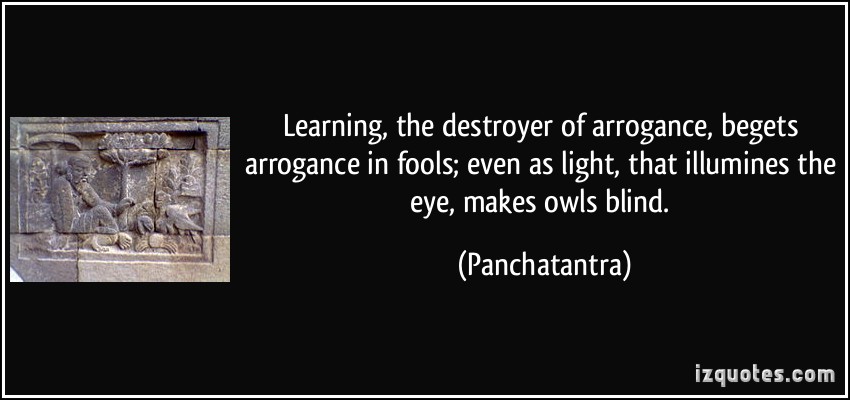
Despite his learning, Ramalinga had humility, and knew that education was an ornament for the just and modest. He used it with responsibility and tried to correct even the most incorrigible with gentility of spirit.
“Appalacharya used to think that since he was a family priest of a royal family and his sect was considered above the [Smaartha] Brahmin sect, he should be more close to the king; but the affection of King Krishna Dev Rai for Tenali Ramakrishna was not hidden from his eyes. And this precisely was the reason why Appalacharya was extremely jealous of him.” [1, 25]
“King Krishna Dev Rai became very serious. He looked at Appalacharya and said—‘Pundit Ji! Scholars like you are supposed to have a broader perspective of life; people like you should have be broad-minded, or else, there would be no difference between you and an ordinary person,’ and then turning towards Tenali Ramakrishna, he added ‘And Tenali Ramakrishna! What you have done today is definitely an eye-opener.’ Tenali Ramakrishna and Appalacharya, both embraced each other and vowed to forget their differences” [1, 31]
There are many such episodes in the life of Krishna Deva Raya’s favourite courtier. Indeed, there are far too many to be delineated here. What ultimately matters was the unique ability of Tenali Ramakrishna to deflect the depradations of court eunuchs and visiting upstarts alike. The friendship of TRK with KDR is the true embodiment of brahma-kshatra and one that shows even the most powerful of emperors is won over by humble humour in service of justice.
It is said that some time after the passing of the crest gem of Vijayanagara’s potentates that Ramakrishna returned to Tenali. The man who had cheated death sentences from powerful men so many times could not cheat Yamaraj. It is somewhat poetic that the poet who had defeated so many snakes in his life ultimately left this world due to a snakebite. In the end, it is a tribute to Ramakrishna’s ability to receive the poison of others and give us nectar—in this case, bittersweet.
Achievements
- One of Krishna Deva Raya’s Ashtadiggajas (8 directional guardians), Ramakrishna represents the epitome of Telugu wit and instant comebacks.
- Author of Udbhataraadhya Charitramu
- Composed Paandu-ranga Mahaatmya on the shrine of Pandharpur.
There was no greater kryptonite to the “Intellectual-Yet-Idiot” than Tenali Ramakrishna. He was famous as much for his humour as he was his gentle humanity (maana-tattvam). Vikata comes from the sanskrit vikatattahaasa, meaning boisterous laughter. No doubt this vikramarka among vikatakavis elicited much boisterous laughter in the course of his life.
Ramakrishna’s own magnum opus, Panduranga Mahatmya was an highly reflective and even introspective one. He examined the meaning of paapa and punya in the land of Panduranga himself.
“A Brahmin, Nigama Sarma, who wasted his life in dissipation and debauchery, breathed his last at Pandharpur. A con-troversy ensues between the servants of Yama and the servants of Vishnu; the former were anxious to carry him to hell, as he lived a wicked life, and the latter claimed him for heaven, as he died in that sacred place. Of course, the verdict was in favour of the servants of Vishnu. Raamakrishna’s work is a kaavya of high merit, remarkable for its sonorous dignity of phrasing, and is justly counted as one of the Pancha Mahaa Kaavyas.” [2, 83]
As such, the literary bona fides of this brahmana should be without blemish. That his most frequent focus for correction and introspection was his own community was only further proof of his greatness and an example for us all. Whether in matters of ego or injustice, it is not caste vs caste but dharma vs adharma. Tenali Rama was the exemplar who showed us the importance of countering own-side miscreants.
At a time when pompous caste pride is at an all-time high across all Telugu communities, Tenali showed us the true meaning of Telugu Thanam was to reject pride and defeat injustice wherever it is found. Learning, power, wealth, skill, all are blessings of the Goddess Kaali, and can be taken back by her. It is up to us to use these gifts not for our own aggrandisement or our own community’s, but for the benefit of all society.
In the wake of today’s massing of koopastha mandukas and insufferable gyaanis, Tenali Ramakrishna put-to-paid the pedantic and the pompous alike. But what matters more is not how we are regaled, but what is in turn reflected back to us by such figures.
“Laughter mirrors a man’s nature. What does a man laugh at, whom does he make fun of, and why—these can show how mature his mind his…But humour which shows the foolish pride of others and tries to correct others is good humour which comes from a mind free of poison” [3, 1]
That is the most remarkable achievement of all by the hero of Garalapadu:
Humour with Humanity & Humour for Humanity.
Legacy
Often derogatorily termed a “vidusaka” or “jester”, in truth, the learned Tenali Ramakrishna was neither. In the storied tradition of Dharmic culture is the Vikata Kavi: Poet of Wit. He is the one who does not haughtily believe that the Court exists to honour the Kavi, but rather that the Kavi exists to adorn the court. And who better represents this tradition of the Court Wit across the Vindhyas than Krishna Deva Raya’s favourite courtier.
Although we can thank the lovely folks at Amar Chitra Katha for confusing every North Indian into thinking Tenali RamAN was Tamilian (there’s that wonderful Mannargudi push marketing at work again…), Garlapati Ramakrishna was the epitome of Telugu Thanam. The more heinous crime by Amar Chitra Katha and Congress was the pilfering of these stories to mis-attribute them to Birbal and glorify the mughlai.
Irrespective, the embodiment of this brand of comedic companion belongs to Telugus and the City of Victory. Equal parts intelligent yet humble, witty yet polite, Tenali Rama represents the good-natured comedy that rejects the mean-spirited, and causes all to rise up in dignity. Indeed, in an era of Chanakyanism-gone-wild, Pandit Ramalingacharyulu represents the correct character for Pandits. Rather than domineering and demanding of kings, they must be trusted confidantes who give their learned opinion, but humbly accept the king’s decision. And if perchance the Emperor errs (as did Krishna Deva Raya), the answer is not to seek revenge and destroy society for pride, but to leave the court with dignity until redemption comes.
Tenali Ramakrishna suffered the vicissitudes of life like all of us, but he bore them with with a rare gentility and—in the end— was vindicated. Despite being an orthodox Brahmana, Tenali Rama transcended barriers of caste in a way that is beloved across all-communities, and even cultures. In the present time, perhaps no modern figure has been able to step in his shoes in such a way than Telugu Cinema’s favourite comedic son (although it is rumoured that there is another…from Tamil Nadu this time ’round).
Kanneganti Brahmanandam garu is one who is also universally beloved, not merely for low-brow comedy that has come to characterise much of cinema today, but also for great witty repartee in his repertoire and self-deprecating humour that elevates others while keep oneself grounded. Perhaps that is why Padma Sri garu (a once-upon-a-time Telugu lecturer himself) is not merely known as ‘Anandam’ but ‘Brahm-anandam’.
Interestingly enough, Tenali Ramakrishna’s own cinematic cultural legacy cannot be minimised. Numerous movies across Indian languages celebrate his life and mirth. Kannada, Tamil, and even Hindi serials recall the wonderful dynamic between Emperor and Pandit. However, none more than our own Theeyamaina Telugu can do justice to the wit and wordsmithy of the venerable vikata-kavi (…and no one was better equipped for the role than Akkineni Nageswara Rao garu).
And that may indeed be the greatest legacy of Tenali Ramalingacharyulu. In an era of mean-spirited parochialism and myopic machiavellianism, he is the Vikata-Kavi who elevates and illuminates, all while he courteously illustrates. He is the court wit who gently-reminds us of who we really are and what we are supposed to do, while humbling the over-proud. He causes vismaya with his vidya as much as he entertains with his antics and endears with his endeavours. He is the rare combination of learning with humility. He is as willing to learn as he is to teach. The ever-green student as well as the wise-loyal friend,Garalapadu’s favourite son is needed now more than ever. Amidst a sea of unbearable ego-mania from both the allegedly learned as well as the proudly ignorant, the greatest court poem of all time remains:
Tilakasta-mahisha-bandhana
References:
- Kumar, Anil (Kunwar). Witty Tenalirama. Delhi: Manoj Publications. 2019
- Bhujanga, Chenchiah. A History of Telugu Literature. Forgotten Books. 2015
- T, Sunandamma. Tenali Ramakrishna. Rashtrottana Sahitya: Litent Publishers. 2014
- Immaty, George. Stories of Tenali Raman. Thrissur: H & C Publishing House. 2005
